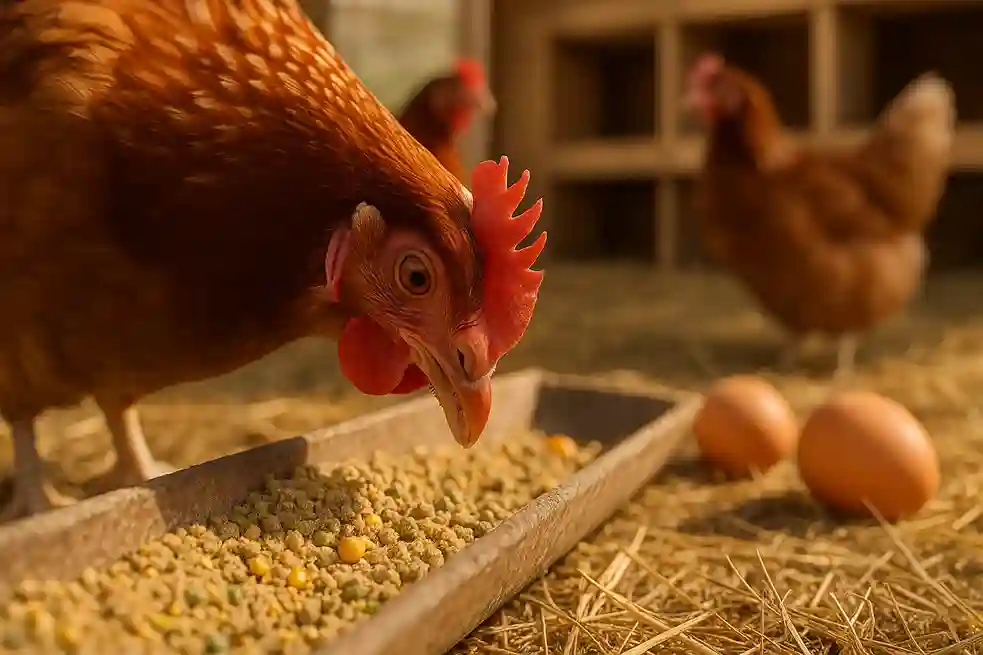Chicken vitamins support hen health and increase egg production. Healthy hens need balanced nutrients for growth, energy, and strong shells. Without enough vitamins, hens may lay fewer eggs, lose feathers, or face illness.
Just like people, chickens rely on daily vitamins to stay active and productive. Therefore, even a small gap in nutrition can create big problems in the coop. For backyard keepers and small farmers in the U.S., this means fewer eggs and weaker flocks.
Moreover, providing vitamins is a simple step that creates lasting benefits. In this blog, you will discover which vitamins matter most, how to spot deficiency signs, and the best natural or supplemental sources. As a result, with the right approach, you can unlock happy thriving hens that reward you with more eggs.
Why Chicken Vitamins Matter
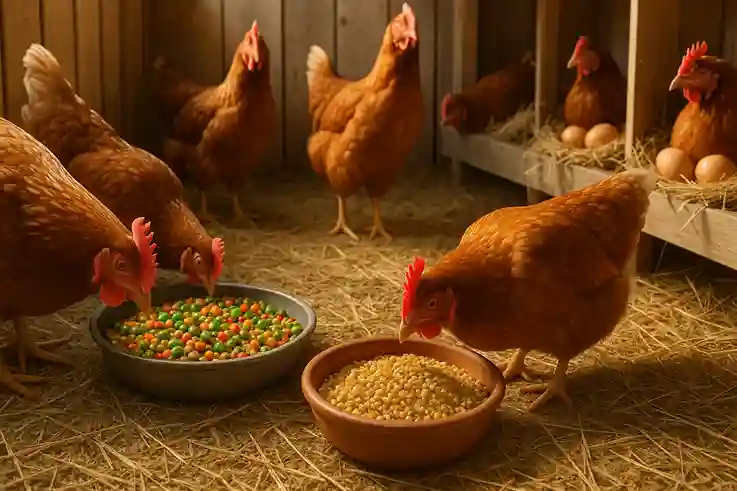
Vitamins → support → body functions. Every hen relies on vitamins to convert feed into energy and maintain strong internal systems. Balanced intake ensures steady growth, solid bones, and lasting productivity.
Hens cannot produce all vitamins themselves. Instead, they must obtain them through feed, supplements, or natural sources like greens and grains. Consequently, missing even one vitamin can disrupt multiple body processes at once. Egg production depends on this balance. Weak shells, pale yolks, or reduced laying usually trace back to nutritional gaps. For example, low vitamin A weakens tissues, while vitamin D shortages harm shell strength.
Chicken vitamins also play a role in disease resistance. Deficient hens often become tired, stressed, or more prone to infection. Moreover, vitamins protect flocks against sudden weather changes and environmental stressors.
Healthy hens repay good care. Stronger immunity, brighter feathers, and better fertility all connect back to consistent vitamin intake. Therefore, vitamins keep hens healthy and productive. They create reliable egg baskets for both small keepers and larger flocks in the U.S.
Key Chicken Vitamins for Egg Production
Egg production depends on several vitamins. Each plays a unique role in hen health and performance. Therefore, understanding them helps you provide better care.
Vitamin A → protects → tissues and eyes
Vitamin A keeps skin, eyes, and organs strong. Hens with enough vitamin A show bright combs and glossy feathers. Moreover, it supports healthy growth and strong immune response. Without enough vitamin A, hens may lose appetite and grow more slowly. Their feathers often become dull and brittle. For example, eye discharge or swelling also signals a clear deficiency.
Therefore, steady vitamin A intake helps hens stay vibrant and productive. It ensures tissues repair quickly and flocks remain active.
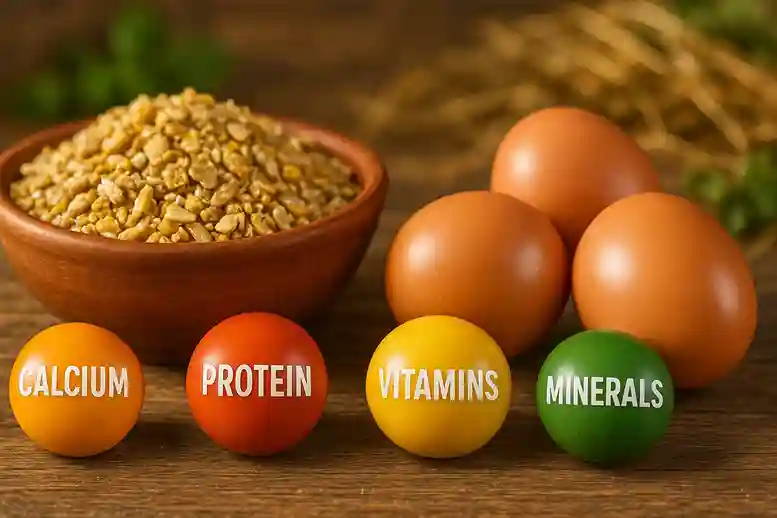
Vitamin D → strengthens → bones and shells
Vitamin D allows hens to absorb calcium effectively. This process builds strong bones and durable eggshells. Moreover, it supports healthy muscle function and steady movement. Hens without enough vitamin D often struggle with soft or thin shells. Their bones may weaken, leading to leg problems or fractures. For example, young chicks develop rickets when vitamin D is missing.
Therefore, consistent vitamin D intake ensures healthier flocks. It protects hens during both growth and peak egg-laying periods.
Vitamin E → boosts → fertility and immunity
Vitamin E supports muscle strength and reproductive health. It keeps egg development steady and improves hatchability in flocks. Moreover, it maintains nerve function and prevents muscular weakness. This vitamin also fights oxidative stress, which damages cells. Hens with enough vitamin E show stronger immunity and faster recovery from illness. For example, deficiencies often cause reduced fertility, poor chick survival, or weak coordination.
As a result, hens stay fertile and resistant to infections. Steady vitamin E intake ensures both vitality and long-term flock performance.
Vitamin B-complex → fuels → energy and growth
The B vitamins such as B1, B2, and B12 control energy use. They also promote steady growth and proper digestion. Moreover, they support feather development and healthy nerve function. When hens lack B vitamins, problems appear quickly. Appetite often decreases, and weight gain slows down. For example, nervous tremors or poor balance may result from severe deficiencies.
Consequently, shortages can lead to poor appetite or nervous issues. A balanced diet with grains, seeds, and supplements ensures steady vitamin B intake for strong flocks.
Vitamin K → prevents → blood clot issues
Vitamin K ensures normal blood clotting. Hens with enough vitamin K heal faster from small cuts and stay active. Moreover, it keeps circulation steady and supports overall resilience. When hens lack vitamin K, small injuries may bleed longer than normal. Recovery also becomes slow, and energy levels often drop. For example, chicks raised on deficient diets may show internal bleeding or poor survival.
In contrast, deficiency causes bleeding problems and slower recovery. Therefore, steady vitamin K intake keeps flocks healthier and less vulnerable to everyday injuries.
Key Chicken Vitamins for Egg Production
| Vitamin | Dependency Role | Benefits for Hens | Signs of Deficiency |
|---|---|---|---|
| Vitamin A | protects → tissues and eyes | Strong skin, eyes, and feathers | Dull feathers, eye discharge, poor growth |
| Vitamin D | strengthens → bones and shells | Hard shells, solid bones, muscle support | Soft shells, weak legs, rickets in chicks |
| Vitamin E | boosts → fertility and immunity | Healthy muscles, strong fertility, infection resistance | Reduced hatchability, weak chicks, poor coordination |
| Vitamin B-complex | fuels → energy and growth | Growth, digestion, nerve health, feather quality | Low appetite, slow growth, tremors, imbalance |
| Vitamin K | prevents → blood clot issues | Normal clotting, faster healing, resilience | Bleeding problems, slow recovery, low survival in chicks |
Signs Your Hens Lack Vitamins
Hens reveal nutrient gaps through clear physical changes. Soft shells, feather problems, or lower egg counts often warn of deficiencies. Therefore, watching your flock closely helps protect long-term health.
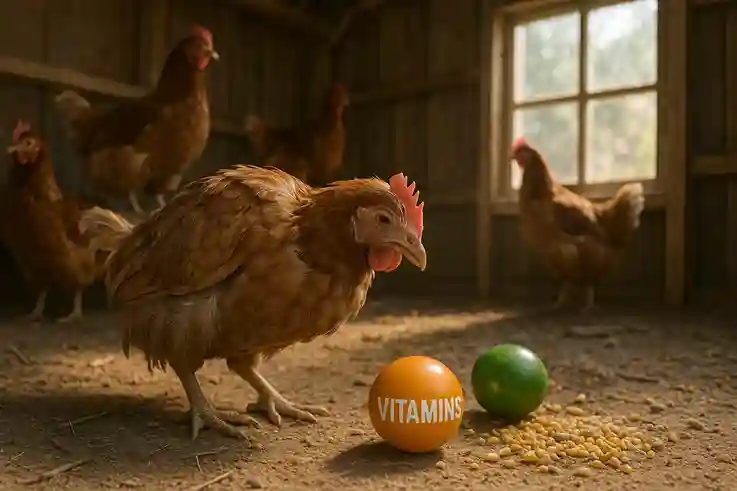
Soft shells → signal → vitamin D shortage
Weak or thin shells appear when hens lack vitamin D. This shortage prevents proper calcium absorption and lowers shell strength. For example, chicks may develop weak bones or visible leg deformities. Moreover, hens in their laying years often produce fragile or misshapen eggs. In severe cases, adult hens may even stop laying altogether.
Feather loss → shows → vitamin A or B gap
Missing feathers or dull plumage point to vitamin shortages. Vitamin A supports healthy tissues that anchor feathers. B vitamins fuel growth and help new feathers form. For example, when hens lack these nutrients, pin feathers may break or fail to open. In contrast, deficiencies slow molting recovery and weaken feather strength. Hens appear ragged, and their combs often look pale. Moreover, poor feather health exposes birds to cold stress and parasites.
Consequently, hens look tired and lose their glossy shine. Balanced vitamin intake restores bright plumage and keeps flocks more resilient.
Low eggs → point → nutrient imbalance
A sudden drop in egg numbers often signals poor nutrition. Missing vitamins disrupt hormone balance and weaken reproductive systems. For instance, vitamin E shortages reduce fertility and slow hatch rates. In addition, vitamin D gaps lower shell strength and cut laying consistency. Moreover, long-term imbalances may lead to lasting egg decline. Hens may stop laying early or produce smaller eggs. In contrast, balanced vitamin intake supports steady cycles and stronger yolks. Consequently, healthy nutrition directly connects to reliable egg baskets over time.
Recognizing signs early avoids lasting damage. Careful observation and timely changes keep hens thriving and productive.
Signs Your Hens Lack Vitamins
| Sign in Hens | Likely Vitamin Deficiency | Corrective Action |
|---|---|---|
| Soft or thin eggshells | Vitamin D | Provide sunlight access, add D supplements, ensure calcium-rich feed |
| Feather loss or dull plumage | Vitamin A or B-complex | Offer leafy greens, add grains and seeds, use balanced supplements |
| Drop in egg numbers | Vitamin E, D, or overall imbalance | Mix vitamin powders in feed or water, rotate diet with fresh greens |
Nutrition for the Backyard Flock — University of Georgia Cooperative Extension (UGA)
This extension publication explains the role of vitamins in chicken diets, including fat-soluble and water-soluble vitamins, and discusses how premixes compensate for natural feed variability
Natural Sources of Chicken Vitamins
Chickens gain many essential vitamins through everyday foods. Offering a variety of natural sources strengthens health and boosts egg production. Moreover, natural options save money and reduce reliance on commercial supplements.
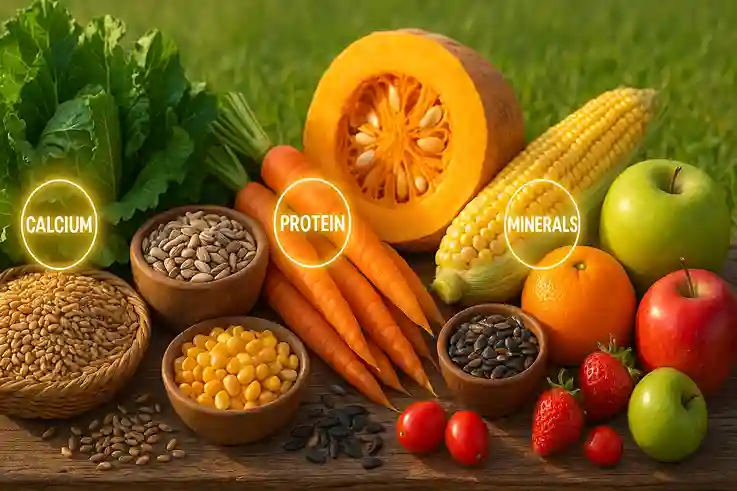
Leafy greens → supply → vitamin A
Fresh greens such as spinach, kale, and lettuce provide vitamin A. This vitamin supports skin, eye, and feather health in hens. For example, flocks with steady access to greens often show brighter combs and glossy plumage.
Moreover, greens improve immunity and help hens resist common infections. In contrast, birds without vitamin A in their diet may develop pale combs and weak feathers. Consequently, offering greens several times a week keeps hens vibrant and more productive.
Sunlight → provides → vitamin D
Direct sunlight helps hens produce vitamin D naturally. This vitamin allows calcium to move into bones and eggshells effectively. For example, hens with regular outdoor access often lay harder, healthier eggs. Moreover, sunlight supports muscle strength and reduces leg weakness. In contrast, flocks kept indoors without sun exposure may struggle with soft shells or brittle bones. Consequently, indoor hens usually need vitamin D supplements in their diet or water.
Grains and seeds → give → B vitamins
Grains like corn, oats, and barley supply steady B vitamins. Seeds such as sunflower or flax also fuel healthy growth. These foods keep hens active, strong, and alert throughout the day.
Moreover, B vitamins from grains and seeds improve digestion and nutrient absorption. For example, hens on balanced diets show smoother feather growth and quicker recovery after molting. In contrast, shortages may cause nervous problems, poor appetite, or reduced weight gain. Consequently, adding grains and seeds ensures reliable energy, better feather condition, and overall flock stability.
Herbs → boost → overall health
Herbs like oregano, parsley, and thyme add extra nutrients to chicken diets. They strengthen immunity and reduce digestive stress in flocks. Moreover, herbs often act as natural antibiotics, lowering the risk of harmful bacteria.
In contrast, hens raised without access to fresh herbs may face weaker defenses and slower recovery from illness. Chicken vitamins from herbs also support long-term productivity and resilience. Consequently, including herbs in feed or garden spaces creates stronger flocks and improves overall egg production.
Natural foods lower costs and support sustainability. They reduce waste, improve nutrition, and keep egg baskets full.
Natural Sources of Chicken Vitamins
| Vitamin | Natural Source | Key Benefit for Hens |
|---|---|---|
| Vitamin A | Spinach, kale, lettuce | Bright combs, strong tissues, glossy feathers |
| Vitamin D | Direct sunlight | Harder shells, stronger bones, better calcium use |
| B vitamins | Corn, oats, barley, sunflower, flax | Higher energy, smooth feather growth, steady digestion |
| Vitamin K | Parsley, leafy greens | Faster healing, normal blood clotting |
| General boost | Oregano, thyme, mixed herbs | Stronger immunity, less digestive stress, natural antioxidants |
Supplement Options for Chicken Vitamins
Sometimes natural sources do not meet every flock’s needs. In those cases, supplements provide an easy and reliable solution. Moreover, they give hens consistent access to all essential vitamins.
Commercial powders → ensure → balanced intake
Powders mix easily into daily feed. They spread evenly, so every hen receives the same chicken vitamin support. This method prevents gaps that can weaken the flock. They deliver multiple vitamins in correct amounts, which prevents accidental imbalances. For example, many blends include A, D, E, and B-complex in one scoop. Moreover, powders store well and stay stable for long periods. In contrast, improper mixing may leave some hens underfed or oversupplied. Consequently, careful measuring and thorough mixing are essential for safe results.
Liquid drops → mix → into water
Liquid supplements blend directly into drinking water. This method ensures every hen receives vitamins throughout the day. It works even for birds that avoid feed or eat less than others. In contrast, dry feed supplements may not reach every bird equally. Uneven feeding often leaves weaker hens without enough support. For example, flocks with pecking order issues benefit from water-based vitamins. Moreover, liquid drops act quickly since nutrients absorb faster through digestion. Consequently, this method is especially useful for weak, stressed, or sick hens needing urgent care.
Pellets → deliver → vitamins with feed
Vitamin-enriched pellets supply both nutrients and calories. Each bite provides a balanced mix, so hens get steady support. This makes feeding routines simple and reliable for backyard keepers. They help save time by combining vitamins and regular feed in one product. For example, daily feeding requires no extra mixing or measuring. In contrast, powders or liquids often need preparation and supervision. Moreover, pellets reduce waste compared to loose powders or separate feeds. Consequently, keepers spend less money on wasted nutrients and keep coops cleaner.
Choosing the right product
Always select poultry-specific supplements. These blends are designed to match the nutritional needs of chickens. In contrast, products made for other animals may include unsafe additives or improper vitamin levels. For example, supplements meant for livestock may contain extra minerals that harm hens. Moreover, using generic vitamins increases the risk of overdosing sensitive birds.
Therefore, reading labels carefully protects hens from harmful ingredients. Checking dosage instructions ensures safe feeding and consistent results. Consequently, smart product choices create healthier flocks and steadier egg production.
Supplements help when natural sources fall short. Used properly, they strengthen flocks and keep egg baskets full.
Practical Tips for Healthy Hens
Daily habits play a major role in flock health. Small, steady changes build stronger hens and improve egg production. Moreover, they prevent deficiencies before they cause serious problems.
Rotate fresh greens
Provide leafy greens several times each week. Rotation keeps hens interested and ensures a wide mix of nutrients. For example, spinach supplies vitamin A, while parsley strengthens clotting with vitamin K. Moreover, variety prevents nutritional gaps and supports steady feather growth. In contrast, feeding the same greens daily may lead to boredom and wasted food. Consequently, rotating greens builds healthier diets and keeps flocks active at mealtime.
Offer grit and clean water
Hens need grit to grind feed and absorb vitamins effectively. Small stones in the gizzard break down grains and seeds into digestible pieces. For example, grit makes it easier for hens to gain full value from their diet.
Fresh water supports digestion and keeps body systems balanced. Moreover, clean water helps regulate temperature and prevents dehydration in warm months. In contrast, dirty water spreads bacteria and lowers feed intake. Consequently, consistent access to grit and clean water protects overall health and keeps egg production steady.
Check hens weekly for signs of deficiency
Observation helps catch problems early. A quick weekly check saves time and prevents bigger flock issues later. Look for soft shells, feather loss, or sudden drops in egg numbers. For example, weak shells may signal vitamin D gaps, while feather loss often points to vitamin A or B shortages. Moreover, sluggish behavior or pale combs can also reveal hidden deficiencies. Consequently, quick action prevents minor issues from becoming major health risks. Regular monitoring builds stronger flocks and keeps production steady through every season.
“Healthy hens start with balanced chicken vitamins—strong shells, bright feathers, and full baskets follow.”
FAQs About Chicken Vitamins
Conclusion
Chicken vitamins unlock healthy, thriving hens with steady egg production. They protect immunity, strengthen shells, and improve flock resilience. Moreover, they ensure your birds remain active and productive across all seasons. Natural foods like greens, grains, and herbs supply many vitamins. In contrast, supplements fill gaps when diets fall short. Consequently, a mix of both methods builds the strongest results.
Consistent care → creates → stronger flocks. Therefore, your hens reward you with brighter feathers, stronger eggs, and longer laying cycles.
Have you tried adding chicken vitamins to your flock’s routine?
Share your experiences, tips, or questions in the comments below. Your insight may help another backyard keeper.

Michael Reyes is a versatile blogger with a primary focus on farming and sustainable living. Growing up close to nature, he developed a deep interest in agriculture and enjoys sharing practical tips on backyard farming, modern cultivation techniques, and eco-friendly practices. While farming remains his specialty, Michael also writes on a wide range of topics, from lifestyle and travel to everyday inspiration, making his work relatable to a broad audience.
Outside of writing, Michael enjoys spending time outdoors, experimenting with new farming methods, and exploring different cultures through food and travel. His approachable voice and well-researched insights make his blogs both informative and engaging.
